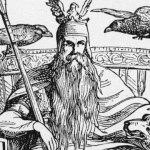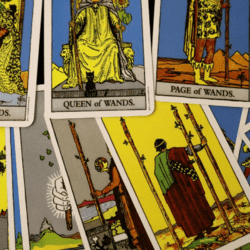Since the dawn of self-awareness, humanity has contemplated the largeness that exists outside of themselves. This contemplation began with observing the stars, seasons, and weather. It continued developing into the days of the first homesteads and the subsequent prosperity or failure of crops. The passing of time was marked by the changing of the weathered landscape as new life bloomed in the Spring and faded into grey, crisp winter months. Survival was dependent on the availability of food and warmth. Many gods were given personified attributes that were directly related to agriculture. Tribes would appeal to their gods for the sustainability of these essentials, and responsibility for making these appeals was placed on the shoulders of kings and priests. As tribes began to move outward in exploration, ideas were traded and new traditions became hallmarks of growing civilizations. When war blazed across the land, factions were introduced, sometimes by force, to gods that had grown larger and more multi-faceted over time. Gods of war, gods of chaos, gods of the sky, fields, hearth, and home came into existence. It all started with a deeper awareness that we were not the center of everything, and that not all things could be explained by the minds and hands of human beings.
The perception of the gods spanning the globe spawned a concept that would take on a life of its own: spirituality. Spiritual blessings were sought from, and sometimes denied by, powerful beings that could bring an other-worldly quality into the lives of people. The gods seemed to exist just outside of the limits of our normal five senses. We couldn’t see them, but we felt their presence. We performed rituals and built traditions that were held in their honor, to bring them closer to us and make them more tangible. We dedicated our souls to them. The dead were revered according to our perceived understanding of the Underworld. Regardless of which polytheistic pantheon held dominion over a certain area of land, the basic tenants of an ever-evolving system of belief remained. These tenants centered around prosperity, health, well-being, and care for the living and the dead. A certain trust was placed in the deities while communities continued to work and toil the best of their ability. Ancient tribes all over the world demonstrate this pattern, even cultures that did not necessarily have much contact with one another.
For a long time, the gods of tribes and kings weren’t considered historical beings. They were the progenitors, the creators, and the personified spirits of life. But as populations exploded and independent villages grew into bustling cities, new gods emerged. For a while, the old gods were remembered. Customs were celebrated, oral histories of their greatness were passed down through generations. The groves remained sacred. Places of sacrifice received their due. By bloodshed, and in times of peace, the gods were called to and brought forth. Over time, though, the trees became a part of the landscape and the new gods of innovation were thrust into the forefront of civilizations. In some cultures, one god replaced the rest with a grand omnipotence that absorbed all of the characteristics of the many gods before it.*
Scholars have poured incredible amounts of time and energy into recreating the traditions and understanding the details of ancient history because they are not just looking for an anthropological source. Some are seeking the old gods so that they will not become lost in time and erased by the gods of invention, materialism, politics, and corporate structure. Although reconstruction of the old ways and customs cannot happen without a historical basis, it’s important that we not get lost in texts and articles, nor in activities that offer instant but empty gratification. Instead, I urge you to read academic articles relating to ancient peoples with a renewed sense of wonder. Place yourselves in the footsteps of your ancestors and remember the first time you participated in a blot, or stood with kinsmen that became your innergard. Those feelings are deeply spiritual and aren’t found on a screen or inside a store.
The pulse of the land, instilled by the gods, has always been there. But in modern society, very few feet are on the ground long enough to feel it. Through the active process of pursuing a spiritual path and offering the sacrifice of our time, however, we open ourselves to this compelling and humbling experience. May we all find the individual heartbeat of our own spirituality, which we were always meant to find!
* The author Neil Gaiman explores this very topic in his novel American Gods. If you’ve not had the opportunity to read it, I recommend it highly to heathens. The main character in the story, Shadow, becomes employed by a man named Mr. Wednesday who turns out to be the All-father himself, Odin. While fiction is not my preferred genre, American Gods is one of my favorite literary reads for its notion of how the old gods became forgotten and misplaced. The book can really get you thinking about how the roles and perception of gods have changed over time.
Heathen Woman is published on alternate Fridays. Subscribe via RSS or e-mail!

















